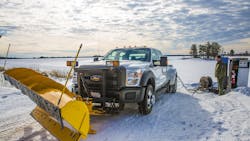Green Fleet of the Month: Fueling sustainability
A natural wonder located in northern Minnesota, Voyageurs National Park spans 340 square miles. Covering roughly 218,000 acres, including 84,000 acres of water, the park is home to 240 species of birds, 42 species of mammals, 53 species of fish, and more than 900 species of flora. Its glacier-carved landscape includes rock formations that are more than 2.5 billion years old, accounting for some of the oldest exposed rock in the world.
Protecting that environment is the park's top priority, noted Bill Carlson, facility manager responsible for fleet, equipment, campsites, and trails. "In every decision we make, in everything we do, we try to be as sustainable as we can," he said. "That goal led us to be an early adopter of biodiesel. We started using it in 2000, and today a B20 blend of biodiesel is our fuel of choice year-round in diesel vehicles and equipment."
The diverse fleet at Voyageurs National Park performs a range of tasks, including towing, hauling, loading, and snowplowing. In the operation are Ford F-800 dump trucks and F-450 trucks with tool and pickup bodies. Also in use is a variety of equipment including snow groomers, crawlers, backhoes, and Bobcats as well as a barge and a 49-passenger tour boat, both powered by twin diesel engines.
The B20 biodiesel blend used in the Voyageurs National Park fleet, including fuel produced by Renewable Energy Group is used throughout the year.
"The nearest town to us is International Falls, Minnesota, which is nicknamed the ‘Icebox of the Nation,' and we've had no problem with biodiesel in temperatures as low as 30 degrees below zero Fahrenheit," Carlson stated. "You just have to make sure you use a proper winter additive, the same as with petroleum diesel, and you won't have any issues at all.
"That not only refutes the myth that biodiesel doesn't work in cold weather," Carlson added. "It also extends the benefits of producing considerably less greenhouse gas emissions compared to conventional diesel during a time of year when the park remains popular with snowmobilers, ice fishermen, and people who come to drive the ice roads to see bald eagles, timberwolves, and other wildlife."
Carlson also related that the positive effect of biodiesel has literally been visible with boats. "Our barge used to billow heavy smoke for several minutes while warming up in cooler weather," he explained, "but that's been cut to a negligible amount with the biodiesel blend."
Backed by a staff that performs regular maintenance to keep the park fleet operating at peak efficiency, Carlson said that biodiesel is providing environmental gains without causing any loss of performance in vehicles and equipment. "We use a Ford F-450 to pull a 1,000-gallon sewage pumper around," he reported. "We thought if anything would notice a loss in power with the B20 blend, it would be that vehicle. But we were surprised when the driver said he couldn't tell the difference.
"For 17 years, we've been running our diesel fleet on biodiesel because it's better for the environment," Carlson stated. "It's truly a green product that helps us achieve our top priority of environmental sustainability. Our return on investment in biodiesel comes from helping to reduce harmful emissions. Biodiesel is good for the environment, for our crews, and for park visitors."
